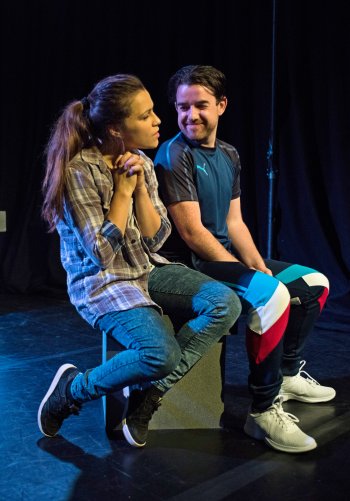Maz and Bricks
Playwright Eva O'Connor's considerable talents don't quite rise to the challenge of her even greater ambitions.

Eva O’Connor and Ciaran O’Brien in a scene from Fishamble’s production of “Maz and Bricks” at 59E59 Theaters (Photo credit: Lunaria)
When it comes to the long, fraught history of the Irish, it’s not always England’s fault. Sometimes the wounds are self-inflicted. That’s the knotty premise underlying playwright Eva O’Connor’s Maz and Bricks, a smart, if overly ambitious, 80-minute two-hander that blends the political with the personal, taking square aim at the Irish constitution’s eighth amendment, which, for roughly 35 years, prevented the government’s judicial or legislative branches from altering the country’s strict anti-abortion laws, thus forcing generations of Irish women to perilously travel to England for the freedom to control their own bodies. Needless to say, the irony is not lost on O’Connor.
Created and first performed during the run-up to the 2018 national referendum that eventually led to the amendment’s repeal, Maz and Bricks, a part of the Origin Theater Company’s 1st Irish Festival, hasn’t suffered any loss of social relevance, because O’Connor is not a single-issue polemicist. Her play brims with many pointed ideas about modern Ireland, which, with greater and lesser success, are woven into a beguiling tale that follows its two titular characters on a Joycean ramble through the streets of Dublin, tripping up most significantly at the end when O’Connor shoehorns in a needlessly melodramatic coda intended to tie together a few loose plot threads that really shouldn’t have been there at all.
Maz (portrayed by O’Connor) meets the voluble Bricks (an increasingly likable Ciaran O’Brien) on a tram, where he is loudly recounting last night’s debaucheries on a cell phone. She does her best to ignore him while finishing a placard for the abortion-rights march to which she’s going. But Bricks, so dubbed because he once lobbed one through a window, is the type who confuses obnoxiousness for charm and, therefore, can’t accept Maz’s obvious annoyance at face value. After finishing his call, he arrogantly concludes that she wants more engagement with him rather than none at all.

Eva O’Connor and Ciaran O’Brien in a scene from Fishamble’s production of “Maz and Bricks” at 59E59 Theaters (Photo credit: Lunaria)
Unsurprisingly, Maz and Bricks soon butt heads over their differing perspectives on abortion, but in a bantering style that quickly makes it clear that O’Connor has, in fact, written a romantic comedy with a classic beauty and the bro setup, though, ignoring genre conventions, she never dumbs down the former to make an attraction to the latter possible. Instead, as their appeal to one another deepens, the dialogue does, too, with Maz and Bricks each sharing vulnerabilities and pain that eventually leads to a plausible emotional bond.
As one might expect, Maz’s committment to the abortion-rights movement is rooted in her own past, while Bricks, a congential screw-up, isn’t completely narcissistic. He’s actually taking the tram to see his four-year-old daughter who is the center of his world, though, much to his chagrin, their plans for a day at the zoo are derailed by his ex’s anger over his recent libidinous activities. Both Maz and Bricks also struggle with other torments that O’Connor teases out much too deliberately.
After the characters briefly go their separate ways, O’Connor contrives to reunite them through circumstances that, let’s just say, seem unlikely in a city of well over a million inhabitants. O’Connor’s storytelling shortcuts, however, are less bothersome than they might be, because the rest of her writing is so compelling, both in terms of structure and content. Maintaining narrative momentum in a two-hander is always tricky, especially when the characters are strangers, a hurdle O’Connor navigates by turning Maz and Bricks into self-confessed “over-sharers,” which has a poignant believability considering how lonely they both appear to be. O’Connor also alternates their exchanges with beautifully composed, verse-tinged monologues that disclose to the audience what Maz and Bricks can’t say to each other, at least not immediately.

Eva O’Connor and Ciaran O’Brien in a scene from Fishamble’s production of “Maz and Bricks” at 59E59 Theaters (Photo credit: Lunaria)
Particularly in Maz’s case, these inner thoughts serve another function, too: cutting through some of the uncritical romanticism of Irish history, as when she observes in the throes of the march, “I glance back at the statue…they’re all the same, they’re all arrogant men…I’d tear them all down given a choice, the men on their pedestals, smiling and towering, erect and alone, running this town, overseeing the city. Stop smiling O’Connell.” It’s a much-needed reminder that Ireland’s long struggle for independence has had a very large and gendered blind spot.
Director Jim Culleton stages O’Connor’s play simply, letting her evocative descriptions of Dublin spark the audience’s imagination rather than requiring anything more concrete from set designer Maree Kearns who, essentially, just provides a couple of places for the actors to sit. Only sound designer Carl Kennedy’s ambient city noises contribute to the production’s sense of place, while lighting designer Sinéad McKenna is called upon to underscore the play’s most theatrically heightened and, unfortunately, least credible moments.
O’Connor herself would have benefited from a little more creative restraint, but, like a lot of young playwrights, she falls into the trap of believing the audience is in constant need of something new to remain interested. Perhaps with her next work O’Connor will realize when she has given us enough.
Maz and Bricks (through February 2, 2020)
Origin Theater Company’s 1st Irish Festival
Fishamble: The New Play Company
59E59 Theaters, 59 East 59th Street, in Manhattan
For tickets, call 212-279-4200 or visit http://www.59e59.org
Running time: one hour and 20 minutes without an intermission





Leave a comment